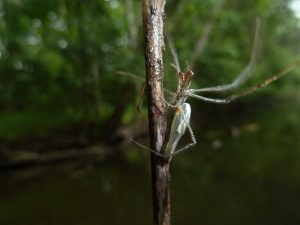 A new collaborative study is the first to show that pharmaceutical pollution in waterways are passed within the food chain when the contaminated insects are eaten by predators. KBS Professor and Cary Institute of Ecosystem Studies Ecosystem Ecologist, Steve Hamilton, was a co-investigator for the study recently featured by Environmental Health News, earth.com, and EurekAlert.
A new collaborative study is the first to show that pharmaceutical pollution in waterways are passed within the food chain when the contaminated insects are eaten by predators. KBS Professor and Cary Institute of Ecosystem Studies Ecosystem Ecologist, Steve Hamilton, was a co-investigator for the study recently featured by Environmental Health News, earth.com, and EurekAlert.
Emma Rosi, an aquatic ecologist at Cary Institute of Ecosystem Studies and a co-author on the paper, explains, “Stream life is swimming in a mixture of pharmaceuticals. Our study is the first to show that this chronic drug pollution can concentrate in aquatic insects and move up food webs, in some cases exposing top predators to therapeutically-relevant doses.
Access the full study text here.

A legacy of conservation; a commitment to sustainability.
3700 E. Gull Lake Drive
Hickory Corners, MI 49060
(269) 671-5117
info@kbs.msu.edu